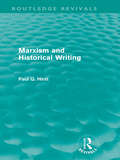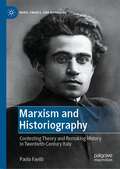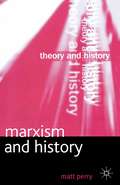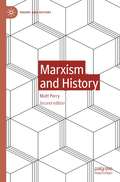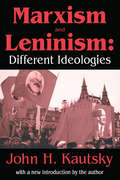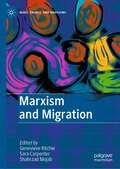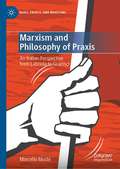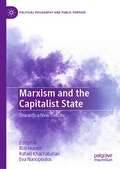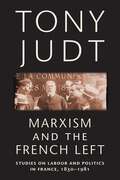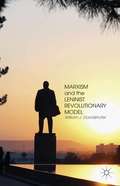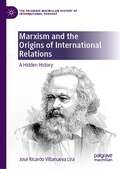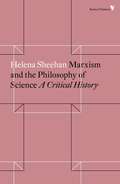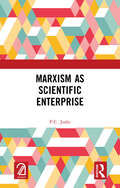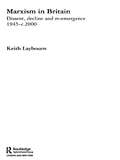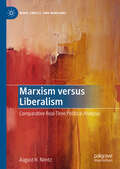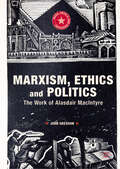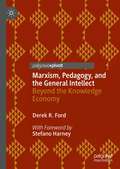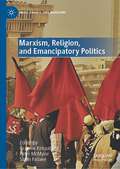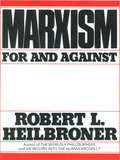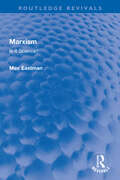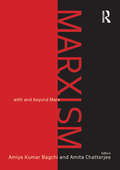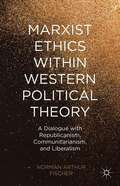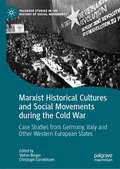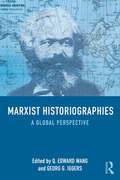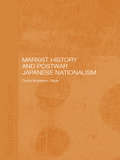- Table View
- List View
Marxism and Historical Writing (Routledge Revivals)
by Paul HirstIn this reissued collection of essays, first published in 1985, Paul Q. Hirst assesses the limits of the Marxist theory of history in its various versions. It begins with an extended critical discussion of Perry Anderson and Edward Thompson, and includes chapters on G.A Cohen’s attempt to re-state the Marxist theory of history in terms compatible with analytic philosophy, on R.G. Collingwood’s theory of history, on Anderson’s work on Absolutism, on Thompson’s Poverty of Theory, and on the contemporary politics of democratic socialism.
Marxism and Historiography: Contesting Theory and Remaking History in Twentieth-Century Italy (Marx, Engels, and Marxisms)
by Paolo FavilliEminent Italian historian Giovanni Levi once notably remarked that “no one is a Marxist anymore,” pointing to a paradox in Italian cultural history. While what is called "Marxism" was supposedly hegemonic over Italian culture, and especially history writing, for decades in the postwar period, it then seems to have suddenly disappeared. This study questions such a vision of a monolithic and hegemonic Marxism. It starts from the most effective anecdote to all ideologising narratives—that is, research into the texts themselves. It sees the Marxist historiography of the post-1945 period as a "history in the making," in which references to Marxian theory were a fundamental factor driving historiographical innovation. This allows the book to bring to light a highly original experience in the development of historiography, based on the long Italian tradition of reflection on historical knowledge.
Marxism and History (Theory and History)
by Matt PerryMarxism and History examines Marxism's enormous impact on the way historians approach their subject. Tackling current historiographical questions in a lively, jargon-free way, Matt Perry offers a concise introduction to: Marxist views of history; key Marxist historians and thinkers; and the relevance of Marxist theory and history to students' own work.
Marxism and History (Theory and History)
by Matt PerryThis textbook examines Marxism’s enormous impact on the way historians approach their subject. Tackling current historiographical questions in an accessible way, the author offers a clear introduction to Marxist views of history, key Marxist historians and thinkers, and the relevance of Marxist theory and history to students’ own work. This is a concise, thorough overview of an important area of historiography. The second edition incorporates significant new developments in research, including Marxist contributions to the emergence of global, maritime and transnational history; the discovery of Marx’s ecologism and the historical critique of fossil capitalism as a source of environmental disaster; a reassessment of gender oppression through social reproduction theory; and the contribution of Marxism to debates on race, Eurocentrism and whiteness.
Marxism and Leninism: An Essay in the Sociology of Knowledge
by John H. KautskyOne of the pre-eminent scholars in the history and theory of European socialism, John Kautsky in this volume develops the argument that Marxism and Leninism are two quite different ideologies. He counterposes this view with the commonly accepted one of Leninism as simply one form that Marxism took in the course of its evolution. The easy identification of Marxism and Leninism with each other has been responsible for great confusion in the realm of both scholarly and political discourse.Kautsky develops his position within the tradition of the sociology of knowledge, by the close examination of the different meanings of the Marxist vocabulary as it was used by Marxists and Leninists. His frame of reference turns on the position of labor in turn-of-the-century industrial Europe and the role of modernizing intellectuals in underdeveloped countries. While the vocabulary used was often common to Marx and Lenin, Marxism was explicitly concerned with appeals to workers in industrial nations such as Germany and Austria, whereas Leninism appeals to revolutionaries in underdeveloped nations such as Russia and China.Whatever be the current assessment of the future of socialism and communism, Kautsky holds that it is important to study the core structure of both Marxism and Leninism, since they were major phenomena that powerfully affected the world in the twentieth century. Beyond that, in dealing with how different ideologies can be ensconced within the same rhetoric, the book offers an outstanding entrance into the sociology of knowledge as a tool for political analysis. This is a unique work in the function of language no less than the nature of ideology.The work is divided into five parts: Two environments, two ideologies, one terminology. The evolution of Marxism, its appeals in the German Empire. The evolution of Leninism, its appeals to strata involved in making modernizing revolutions. The differential outcomes of Marxism in the East and Leninism in the West. And finally, an examination of why Marxism and Leninism have been seen as a single ideology. In a new essay prepared for this new edition, Kautsky provides important autobiographical as well as historical reflections on how this book fits into the overall pattern of the author's work.
Marxism and Migration (Marx, Engels, and Marxisms)
by Sara Carpenter Shahrzad Mojab Genevieve RitchieThis book approaches migration from Marxist feminist, anti-imperialist, and anti-colonial perspectives. The present conditions of transnational migration, best described as a kind of social expulsion, include migrant caravans and detained unaccompanied children in the United States, thousands of migrant deaths at sea, the razing of self-organized refugee camps in Greece, and the massive dispersal of populations within and between countries. Placing patriarchal capitalism, imperialism, racialization, and fundamentalisms at the center of the analysis, Marxism and Migration helps build a more coherent and historically-informed discussion of the conditions of migration, resettlement, and resistance. Drawing upon a range of academic disciplines and diverse geopolitical regions, the book rethinks migrations from the vantage point of class struggle and seeks to ignite a more robust discussion of critical consciousness, racialization, militarization, and solidarity.
Marxism and Philosophy of Praxis: An Italian Perspective from Labriola to Gramsci (Marx, Engels, and Marxisms)
by Marcello MustèThis book will offer a full reconstruction of the history of Theoretical Marxism in Italy between 1895 and 1935, based on a rigorous philological method. The starting term (1895) is marked by the publication of Antonio Labriola's first essay on historical materialism (In memory of Communist Manifesto); the final term coincides with the conclusion of the "Prison Notebooks" written by Antonio Gramsci. This book analyses the original character of the Marxist philosophy in Italy, which emerged by distinguishing itself from the "orthodoxy" of the Second and Third International. By delineating a significant chapter in the history of Marxism, the book will also propose a specific contribution to the history of Italian Philosophy, which is here studied in relation to the developments of European philosophy, beyond the traditional subdivisions of Positivism, Idealism and Marxism.
Marxism and the Capitalist State: Towards a New Debate (Political Philosophy and Public Purpose)
by Rob Hunter Eva Nanopoulos Rafael KhachaturianThis book builds on the recent revival of interest in Marx and Marxism, calling for a renewal and refinement of Marxist state theory. It aims to provoke and encourage new debates and critiques that build on—but also update and extend—the rich tradition of Marxist analyses of the capitalist state, including the well-known debates of the 1970s. The chapters present a dynamic and diverse constellation of arguments and perspectives on a range of topics, from general re-appraisals of the capitalist state to investigations of contemporary challenges—including digitalisation, the ecological crisis, the coronavirus pandemic, social reproduction, and critical political economy. What they share is a commitment to an understanding of the specifically capitalist character of the modern state and its significance for any serious discussion of the causes of our current age of global catastrophe and the overcoming of capitalist social relations.
Marxism and the French Left: Studies on Labour and Politics in France, 1830-1981
by Tony JudtUnlike most books, which treat labor, Socialist and Communist history separately and view French Marxism as a self-contained philosophical phenomenon, Marxism and the French Left offers a refreshingly different approach to the subject. Judt emphasizes the complex and interwoven themes that unify the topics of his essays to construct a distinctive and original interpretation of French left-wing politics over the past 150 years.“A well-informed and persuasive reinterpretation of the old French Left that is now receding beyond recall, except for historians.”—Times Literary Supplement
Marxism and the Leninist Revolutionary Model
by William J. DavidshoferThis book explores Marxist and Leninist revolutionary theory. Topics include: the philosophical dialectic, historical materialism, the revolutionary movement, and Communist cadre political rule in the socialist state. Emphasis on Lenin's wartime political treatment of imperialism, national self-determination, and socialism in one country.
Marxism and the Origins of International Relations: A Hidden History (The Palgrave Macmillan History of International Thought)
by José Ricardo Villanueva LiraThis book investigates to what extent and in what ways Marxist writings and precepts on imperialism informed the so-called idealist stage of International Relations (IR). Though the formative years of International Relations coincide with a vibrant period in Marxist political thought, Marxism is strikingly absent from the historiography of the discipline. Building on the work of revisionist scholars, the book reconstructs the writings of five benchmark IR thinkers. Villanueva analyzes the cases of John Hobson, Henry Brailsford, Leonard Woolf, Harold Laski and Norman Angell to explore the influence that Marxism played in their thinking, and in the “idealist years” of the discipline more generally. He ultimately demonstrates that, although Marxist thought has been neglected by mainstream IR disciplinary historians, it played a significant role in the discipline’s early development. As such, this book both challenges the exclusion of Marxist thought from the mainstream disciplinary histories of IR and contributes to a deeper understanding of the role it played in early 20th century IR theory.
Marxism and the Philosophy of Science
by Helena SheehanA masterful survey of the history of Marxist philosophy of science. Now with a new afterword. Skillfully deploying a large cast of characters, Sheehan retraces the development of Marxist philosophy of science through detailed and highly readable accounts of the debates that have characterized it. Approaching Marxism from the perspective of the philosophy of science, Sheehan shows how Marx's and Engel's ideas on the development and structure of natural science had a crucial impact on the work of early twentieth-century natural philosophers, historians of science, and natural scientists. From the ideas of Marx and Engels, those of the Marxist theoreticians of the Second International to the debates within Russian Marxism up to World War II, Sheehan masterfully surveys the history of marxist philosophy of science, concluding with a close analysis of the development of the debate among non-Soviet Marxists, placing particular emphasis on the contributions of leading British Marxists in the 1930s.
Marxism as Scientific Enterprise
by P.C. JoshiIn this colletion of essays the eminent social scientist, Dr. P.C. Joshi, argues that Marxism needs to be extended beyond the traditional confines set by Lenin and Mao in order to remain relevant in societies in which individuals have freedom of political expression and which are witnessing gigantic strides in communication technology. In democratic societies with a vibrant media, the Lenin-Mao inspired templates of conspiracy and peoples' war carry far less traction than in autocracies where communism has been successful. Dr. Joshi argues that democracy is ingrained in the spirit and legacy of Marx and the two can be true partners in social development. This requires tapping into classes and strata not considered by mainstream Marxists such as intermediate classes, intellectuals and bureaucrats, and harnessing the liberating potential offered by advances in technology.
Marxism in Britain: Dissent, Decline and Re-emergence 1945-c.2000 (Routledge Studies in Modern British History #Vol. 3)
by Keith LaybournSince the Second World War, Marxism in Britain has declined almost to the point of oblivion. The Communist Party of Great Britain had more than 50,000 members in the early 1940s, but less than 5,000 when it disbanded in 1991. Dissenting and Trotskyist organisations experienced a very similar decline, although there has been a late flowering of Marxism in Scotland. Based on the Communist Party archives at Manchester, this text examines the decline over the last sixty years. Dealing with the impact of the Cold War upon British Marxism, the book looks at how international events such as the Soviet invasions of Hungary and Czechslovakia affected the Communist Party of Great Britain. The issues of Marxism and Britain’s withdrawal from the Empire are also addressed, as are the Marxist influence upon British industrial relations and its involvement in the feminist movement. Focusing on the current debate in British Marxist history over the influence of Moscow and Stalinism on the Communist Party, Keith Laybourn explores the ways in which this issue, which divides historians, undermined Marxism in Britain.
Marxism versus Liberalism: Comparative Real-Time Political Analysis (Marx, Engels, and Marxisms)
by August H. Nimtz“An extraordinary work of political historical analysis that methodically and convincingly argues for the superiority of a Marxist approach for pursuing democracy. Rich in historical detail and thoroughly engrossing in portraying the real-time analyses of and intervention in crucial events by prominent Marxist and liberal theorists and political actors, Marxism versus Liberalism is a truly impressive achievement that will have an enduring appeal.” —John F. Sitton, Professor Emeritus, Political Science, Indiana University of Pennsylvania, USAPerforming a comparative real-time political analysis, Marxism versus Liberalism presents convincing evidence to sustain two similarly audacious claims: firstly, that Karl Marx and Frederick Engels collectively had better democratic credentials than Alexis de Tocqueville and John Stuart Mill; and secondly, that Vladimir Lenin had better democratic credentials than Max Weber and Woodrow Wilson. When the two sets of protagonists are compared and contrasted in how they read and responded to big political events in motion, this book contends that these Marxists proved to be better democrats than the history’s most prominent Liberals. Exploring the historical scenarios of The European Spring of 1848, the United States Civil War, the 1905 Russian Revolution, the 1917 Russian Revolution, and the end of World War I, Marxism versus Liberalism carefully tests each claim in order to challenge assumed political wisdom.
Marxism, Ethics and Politics: The Work Of Alasdair Macintyre (Marx, Engels, And Marxisms Series)
by John GregsonThis book discusses Alasdair MacIntyre’s engagement with Marxism from the early 1950s to the present. It begins with his early writings on Marxism and Christianity, moving through his period in the New Left and the Socialist Labour League and International Socialism in the late 1950s and 1960s. It then discusses MacIntyre’s break with Marxism by developing the brief but telling five-point critique he gives of Marxism in his 1981 volume After Virtue. Marxism, Ethics and Politics highlights MacIntyre’s continuing admiration for much in Marx’s thought, noting that his contemporary project is developed in response to what he now sees as the inadequacies of Marxism, particularly Marxist politics. It concludes by examining the place of Marxism in the contemporary MacIntyrean debate and by pointing out the contested nature of the claims about Marxism that MacIntyre makes.
Marxism, Pedagogy, and the General Intellect: Beyond the Knowledge Economy
by Derek R. FordThis book is the first to articulate and challenge the consensus on the right and left that knowledge is the key to any problem, demonstrating how the left’s embrace of knowledge productivity keeps it trapped within capital’s circuits. As the knowledge economy has forced questions of education to the forefront, the book engages pedagogy as an underlying yet neglected motor of capitalism and its forms of oppression. Most importantly, it assembles new pedagogical resources for responding to the range of injustices that permeate our world. Building on yet critiquing the Marxist notion of the general intellect, Derek R. Ford theorizes stupidity as a necessary alternative pedagogical logic, an anti-value that is infinitely mute and unproductive.
Marxism, Religion, and Emancipatory Politics (Marx, Engels, and Marxisms)
by Graeme Kirkpatrick Simin Fadaee Peter McMylorThis edited collection evaluates the relationship between Marxism and religion in two ways: Marxism’s treatment of religion and the religious aspects of Marxism. Its aim is to complicate the superficial understanding of Marxism as a simple rejection of religion both in theory and practice. Divided into two parts (Theory and Praxis), this book brings together the three different themes of Marxism, religion, and emancipation for the first time. The first part explores the more theoretical discussions regarding the relationship between Marxism and various themes (or currents) within religious thought, to highlight points of compatibility as well as incompatibilities/conflicts. The studies in the second part of the collection refer to how Marxist ideas are received in different parts of the world. They show that as soon as Marxism arrives in a new place, the theory interacts and bonds with a pre-existing stock of ideas, each changing the other reciprocally.
Marxism: For and Against
by Robert L. Heilbroner"Genuinely open-minded and inquiring. . . .it intelligently summarizes and shrewdly questions four central topics of Marxist thought--the dialectical approach to philosophy, the materialist interpretation of history, the socio-analysis of capitalism and the commitment to socialism." --Raymond Williams, Cambridge University In the lucid style and engaging manner that have become his trademark, Robert L. Heilbroner explains and explores the central elements of Marxist thought: the meaning of a "dialectical" philosophy, the usefulness and problems of a " materialist" interpretation" of history, the power of Marx's "socioanalytic" penetration of capitalism, and the hopes and disconcerting problems involved in a commitment to socialism. Scholarly without being academic, searching without assuming a prior knowledge of the subject, Dr. Heilbroner enables us to appreciate the greatness of Mark while avoiding an uncritical stance toward his work.
Marxism: Is it Science? (Routledge Revivals)
by Max EastmanFirst published in 1941, Marxism: Is it Science? was written to present the author’s criticisms of Marxism and, in doing so, to further exemplify his ‘Method of Instruction’ first proposed in an earlier work. The book is divided into six parts to provide six complete presentations of Marxism and why the author considers it unscientific. The six different approaches, varying in focus and complexity, work together to give the reader a detailed overview of Marxism and the authors critique of it.
Marxism: With and Beyond Marx
by Amita Chatterjee Amiya Kumar BagchiThis book offers a unique re-conceptualization of Marxism in bringing together leading scholars across disciplines — history, philosophy, economics, politics, sociology, and literary and culture studies — into one comprehensive corpus. It demonstrates the engaging relevance of the perspectives and techniques of the analyses adopted by Karl Marx, Frederich Engels and contemporary Marxists, and will be immensely useful to scholars and researchers across social sciences as well as general readers interested in Marxism.
Marxist Ethics within Western Political Theory
by Norman Arthur FischerAs widely applied as Marxist theory is today, there remain a host of key western thinkers whose texts are rarely scrutinized through a Marxist lens. In this philosophical analysis of Marx's never-before translated German notes on Machiavelli, Montesquieu, Rousseau, and Lewis Henry Morgan, Norman Fischer points to a strain of Marxist ethics that may only be understood in the context of the great works of Western political theory and philosophy particularly those that emphasize the republican value of public spiritedness, the communitarian value of solidarity, and the liberal values of liberty and equality.
Marxist Historical Cultures and Social Movements during the Cold War: Case Studies from Germany, Italy and Other Western European States (Palgrave Studies in the History of Social Movements)
by Stefan Berger Christoph CornelissenThis book explores the relationship between diverse social movements and Marxist historical cultures during the second half of the twentieth century in Western Europe, with special emphasis on the Federal Republic of Germany and Italy. During the Cold War, Marxist ideas and understandings of history informed not only the traditional Communist Parties in Western Europe, but also influenced a range of new social movements that emerged in the 1970s in the wake of the 1968 student rebellions. The generation of 1968 was strongly influenced by neo-Marxist ideas that they subsequently carried into the new social movements. The volume asks how Marxist historical cultures influenced third world movements, anti-fascist movements, the peace movement and a whole host of other new social movements that signaled a new vibrancy of civil society in Western Europe from the 1970s onwards.
Marxist Historiographies: A Global Perspective
by Georg G. Iggers Q. Edward WangMarxist Historiographies is the first book to examine the ebb and flow of Marxist historiography from a global and cross-cultural perspective. Since the eighteenth century, few schools of historical thought have exerted a more lasting impact than Marxism, and this impact extends far beyond the Western world within which it is most commonly analysed. Edited by two highly respected authors in the field, this book deals with the effect of Marxism on historical writings not only in parts of Europe, where it originated, but also in countries and regions in Africa, Asia, North and South America and the Middle East. Rather than presenting the chapters geographically, it is structured with respect to how Marxist influence was shown in the works of historians in a particular area. This title takes a dual approach to the subject; some chapters are national in scope, addressing the Marxist impact on historical practices within a country, whereas others deal with the varied expressions of Marxist historiography throughout a wider region. Taking a truly global perspective on this topic, Marxist Historiographies demonstrates clearly the breadth and depth of Marxism’s influence in historical writing throughout the world and is essential reading for all students of historiography.
Marxist History and Postwar Japanese Nationalism
by Curtis Anderson GayleThis book explores the historical writings of postwar Japanese Marxists - who were, and who continue to be, surprisingly numerous in the Japanese academic world. It shows how they developed in their historical writing ideas of 'radical nationalism', which accepted presupposed ideas of Japan's 'ethnic homogeneity', but which they saw as a 'revolutionary subject', creating a sphere of radical political action against the state, the American Occupation and global capital. It compares this approach in both prewar and postwar Marxist historiography, showing that in the postwar period ideas were more elaborate, and put much more emphasis on national education and social mobilization. It also shows how these early postwar discourses have made their way into contemporary ethnic nationalism and revisionism in Japan today. The book's rich and interesting analysis will appeal not just to historians of Japan, but also to those interested in nationalism and Marxism more generally.
